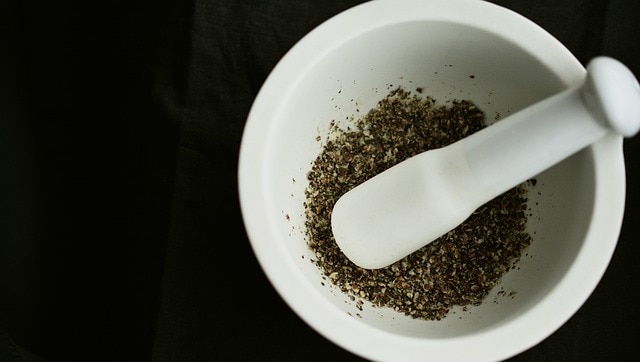While Western medicine continues to be the predominant form of treatment and medication all over the world, there is a growing tribe of followers for alternative medicine and wellness therapies. Of all these types of treatment, the benefits of Ayurvedic medicine are undeniable and have contributed to its popularity over the last two decades.
Ayirvedic medicine has many general benefits. It’s sustainable and eco-friendly. Has little to no side effects for most people. And it takes a unique holistic approach to your mental and physical health unlike many Western medicines. As lifestyle troubles become more common, Ayurvedic medicine helps offer a low-impact method to combat and prevent common conditions.
In this post, we’re going to discuss the origins and benefits of Ayurvedic medicine so that you can decide if it is a good option for you.

What is Ayurveda?
Ayurveda is a traditional wellness system that originated in ancient India over 5000 years ago. It believes in a holistic approach with customized treatments that focus on prevention of illness. The core principle is to create balance within you, removing any potential imbalances. Ayurveda also involves a variety of other holistic practices that share a common aim:
- Panchakarma, or detoxing the body
- Balancing energies through meditation
- Massage and relaxation techniques
- Physical and muscular health through yoga
- Customized diet plans
- Herbal remedies
All these treatments aim at achieving balance and removing toxins, both physically and emotionally. Over time and with the correct treatment, you can expect to feel reduced stress and better focus, a stronger connection between the mind and body, and a smoother flow of energy.
In Australia, the benefits of Ayurvedic medicine make it an increasingly sought-after form of treatment. This is to the point now that it is treated as a bonafide system of medicine, regulated by official bodies and even covered by some private health funds.
Is Ayurvedic Medicine different from Western Medicine?

Western medicine focuses on suppressing the symptoms of the disease. To achieve results as fast as possible, it treats the disease as a whole. It is effective for quick relief from pain, to stop the spread of an illness, or to prevent the illness from becoming critical.
One of the greatest benefits of Ayurveda is that it focuses on the individual and the impact of the disease on the overall health of the individual. By doing so, we ensure the lowest amount of side effects while guaranteeing the greatest improvement to the body.
Common Conditions treatable with Ayurvedic Medicine
Skin conditions
Skin conditions like psoriasis and eczema are suitable for Ayurvedic treatment, especially in milder cases. Our approach for skin conditions is two-pronged. First we treat the internal causes through purification of the blood and defence systems. Second, we treat the skin through topical application of soothing, antiseptic substances like aloe vera gel. Avuryedic medicine also suggests dietary changes to help keep our skin problems away. These typically come down to avoiding oily or spicy foods, and focusing on fresher unprocessed fruits and salads.
Digestive conditions
Many of us struggle with the occasional digestive disorder like hyperacidity and constipation. Most Ayurvedic medicine practitioners offer natural or herbal medicines for such cases, working towards cleansing the system and improving the digestive processes. They may also recommend lifestyle changes like regular walks, specific yoga poses that help with bowel movement and digestion, or dietary changes like avoiding deep-fried or spicy food.
Common colds
For those of us who suffer from frequent colds and coughs, there are many benefits of Ayurvedic medicine for treatment. It uses soothing natural herbs like ginger, lemon, or holy basil for treatment, giving you the chance to avoid the side effects of taking over-the-counter medicines on a regular basis.

If you catch colds often, you should consider talking to an Ayurvedic doctor about strengthening your immune system. This may include lifestyle changes or dietary recommendations such as eating clear liquids and vegetables, but it can have a positive effect on your general health.
Joint and bone pain
Practitioners of Ayurvedic medicine will usually recommend yoga and exercise to treat joint pain caused by sedentary lifestyles or inadequate muscle strength. It can also be used in conjunction with Western medicines (please discuss this with your doctor for individual recommendations) by prescribing practices like Ayurvedic massage therapy, hot fomentation, eating fresh herbs like ginger, and more.
Serious conditions:
When it comes to conditions like diabetes or heart disease, it is imperative that you regulate and monitor your health and continue with your prescribed medicines. However Ayurvedic medicine can help with complementary treatments.
For diabetes, Ayurvedic medicine aims at helping the body metabolize sugar and cleanse the system. This may require adding specific ingredients like cinnamon to your diet or beginning a yoga practice.
When it comes to heart conditions, you can use Ayurvedic medicine to lower stress levels and improve circulation. This usually involves calming meditation practices, walking, and exercise.
Is Ayurvedic medicine right for me?

Ayurvedic medicine takes its cues from the principles of Ayurveda and treats illness at the root. By removing or reducing the cause of illness, the symptoms will dissipate of their own accord. With a customized treatment plan, one can achieve an optimal balance of body, mind, and spirit.
Ayurvedic medicine is a slow but long-lasting solution that is especially effective for chronic conditions that are not severe. This includes digestive problems such as acid reflux or heartburn, skin conditions like psoriasis or eczema, and allergies.
In cases where symptoms are debilitating or have a heavy impact on the quality of your life, it may be hard to be patient with the long duration of treatment. Depending on the complaint and the course of treatment, you may see results immediately but this is not always possible.
Can I use Ayurvedic herbs in my daily life without a prescription?
Yes, you certainly can! There are a few herbs and ingredients recommended by Ayurveda that will help improve your health, all of which can be taken without fear of side effects or a prescription.
With Ayurvedic herbs benefits include boosted immunity, a stronger digestive system, and easy treatment of mild health complaints.
Here are some suggestions:
Panchakarma use in Ayurvedic Medicine
It’s easy to lose track ourselves between all our routines and daily struggles. We may neglect our bodies and minor conditions until we end up with multiple health complaints. When this happens, you may notice low energy, feelings of depression, increased frequency of allergies, headaches, and digestive trouble.
At a time like this, the body requires significant ‘resetting’ to achieve better health. The Panchakarma form of treatment involves five different styles of therapy to achieve this resetting. It works on multiple issues and aims at restoring balance and unblocking stagnant energy so that your body and mind can function at full capacity again.

Panchakarma involves the following treatment:
- Oil massage or hot bolus massage to loosen muscles and relieve joint pain
- Induced vomiting (emetics) to loosen congestion in the chest and remove extra mucus
- Enemas to boost the elimination system and cleanse the bowels
- Controlled administration of laxatives to remove toxins from the intestines
- Nasyam or oil treatments for the nostrils to cleanse the nose, throat, sinus, and head to regulate and improve breathing while remove blockages
This process usually takes a few sessions because it can be quite intense. All treatments are administered by professionals and with specific dosages, but they also require dedication from you in the form of diets and rest.
If you have any pre-existing health conditions, do check with your medical practitioner before signing up for this treatment.
The benefits of Ayurvedic Medicine for Dosha Health
In the absence of specific health conditions, Ayurvedic medicine works on the principles of balancing the dosha system. The doshas are a set of three life energies of your body – kapha, pitta, and vata. When they are in balance, we are healthy, energetic, and calm. But all of us tend to have an imbalance and lean more towards one or two types of dosha.
Too much of one dosha can lead to health problems and a restless, unproductive mind. Ayurvedic medicine helps to balance these doshas ensuring better mental and physical health.
Practitioners of Ayurvedic medicine will provide diet recommendations based on the dominant dosha, to help you arrive at a balance that suits your temperament. They may also suggest exercises for energy, massage practices for detoxing the body and calming the mind, and specific yoga poses or routines for trouble areas.
Here is a short summary of the doshas and their characteristics:
Kapha
People with a dominant kapha dosha may be prone to weight gain, sluggish circulation, low energy, and bloating. On the positive side, they have relatively stable placid personalities, are tolerant and patient, and can be quite strong.
Kapha doshas should avoid cold dairy products, fried food, and red meat. They thrive on a diet of of grilled, roasted, or steamed light food. Beneficial spices for kaphas include cumin, ginger, garlic, and sesame.

Vata
Vata types have higher anxiety levels and may be prone to insomnia, constipation, and frequent coughs. They have high energy but low stamina, tending to burn bright and burn out fast. They can be very creative and charming, but may also be jumpy and nervous.
Vata doshas should avoid cold or raw foods, and will do best on dense, warm foods. They can tolerate dairy, meat, and natural sugars in fruits. However, it is recommended they avoid caffeine, sugar, and bitter herbs like parsley or coriander. Beneficial spices for vatas include cumin, saffron, ginger and garlic.
Pitta
Those with a dominant pitta dosha may be impatient, bright, and charismatic, but they are likely to be irritable and reckless more often. They may be prone to nausea or rashes, and therefore should avoid excesses of sour or salty foods. They can eat most vegetables and will do best on a largely vegetarian diet. Pittas can be drawn to bitter foods and can eat these ingredients without harm: coriander, cinnamon, mint, plums, turmeric, etc.

Want to continue with Ayurvedic Medicine?
Keep in mind, that to achieve the best results you should get a dedicated plan by certified practitioners. To get the desired results, always ensure you take the medicines as prescribed and adhere to the diet and lifestyle changes suggested to you. If you have existing medical conditions or are taking prescription medicine, do consult your GP or medical practitioner about adding Ayurvedic herbs or medicines into your routine.
If you would like to find an Ayurvedic wellness centre, Avaana can help. Avaana allows you to find and compare practitioners near you, to ensure that you’re choosing the best choice for you. Start today, and get up to 20% off your first booking with Avaana.
Be well, feel good, and smile a lot!



